Elizabeth Beisel Joins Champion’s Mojo Podcast for Post-Career Chat
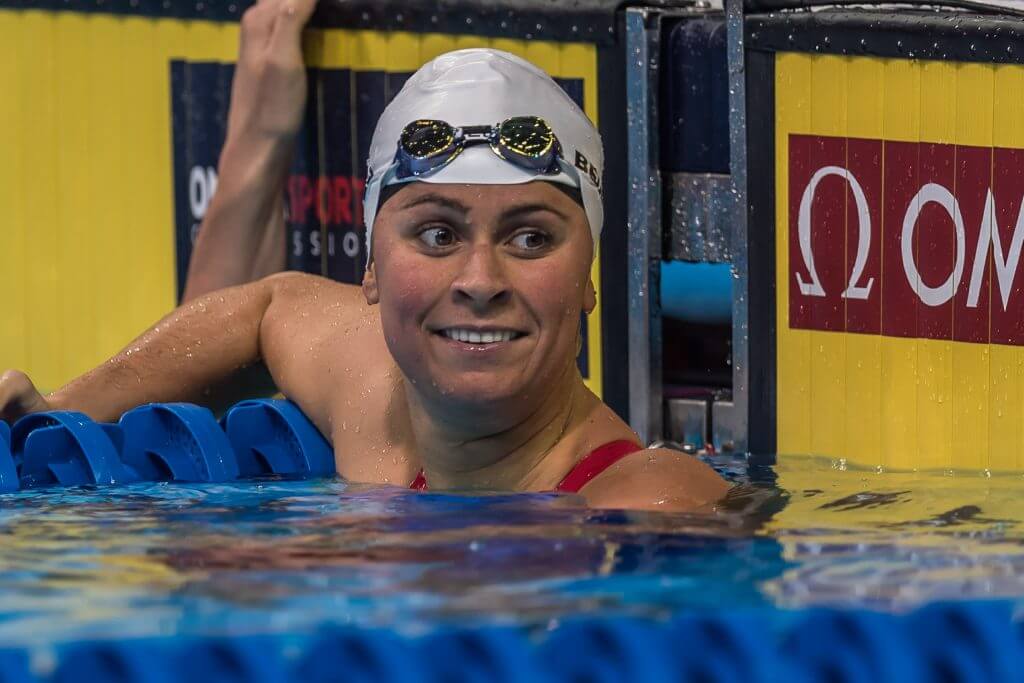
A three-time Olympic swimmer, a Team USA captain, broadcast journalist, and author of the new book, Silver Lining, Elizabeth Beisel gives an authentic interview on what’s she’s been up to lately. She shares her champion’s take on competitiveness, mindset and the traits she thinks all champions share. And she offers some great advice for those aiming to make the 2020 Olympic Team when she chats with Champion’s Mojo hosts Kelly Parker Palace and Maria Parker.
Below is an abridged Q&A of the interview with Elizabeth Beisel. You can listen to the full podcast episode #53 on the Champion’s Mojo website by clicking here.
Champion’s Mojo: So catch us up on where you are now and what you’re up to.
Elizabeth Beisel: So life has been crazy since swimming. I retired from swimming back in December of 2017. So we’re going on year three of retirement and it’s wonderful. I think the thing that I miss most about swimming is just the people. But life on the land is treating me super well. I am getting to say yes to a lot of opportunities that I wouldn’t have ever been able to say yes to had I been swimming. So that’s been really refreshing.
Champion’s Mojo: What have you said yes to that you previously wouldn’t have?
Elizabeth Beisel: I went to Mount Everest and did base camp. Like before if I ever said, “Hey, Coach Troy, I’m leaving to go to Mount Everest for three weeks, he’d be like, you’re off the team. Kiss your Olympic medals goodbye.” You know what I mean? So for me to just be able to travel a ton and say yes to more commentating gigs and traveling and covering swimming has just been really amazing and refreshing to sort of have a new perspective on life. I think all of us, as swimmers, we live in that swimming bubble and we never realize how small it is until we get out of it. So for me now, being able to look from the outside in, it’s really amazing how we really do get sucked into it. Because swimming is our world.
Champion’s Mojo: That’s awesome! So I hear you have a new book. Tell us a little about that
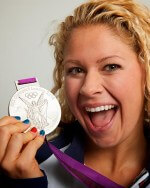 Elizabeth Beisel: Yes, the book is out and it’s called Silver Lining. So that’s also one of the things I’ve been up to. For the past two years I’ve been sort of writing down stories about my swimming career and I’ve been doing a lot of public speaking and clinics and I love telling stories. That’s my main thing. And so after every speaking gig or whatever, I would always get somebody coming up to me saying “Elizabeth, you should write a book.” And I heard it enough. I said fine, I’ll write a book. And so it’s exactly how you imagined it. It’s me opening my laptop and being like, okay, chapter one. I didn’t know what I was doing. I was bored. It was really cathartic for me to write because I feel like a swimmer’s looks so happy go lucky when shown by the media. We win Olympic medals, we’re Olympians, life is great. But they never have the opportunity to really dive in a little bit deeper into that. And so for me, yeah, I had a great career. I won medals. I broke records. All that stuff. I feel like what people don’t realize about my career is that there were a lot more lows than probably the public ever knew about. And that I spoke about. And I finally got to a point in my life when I started writing the stories down for the book that I was ready to sort of open up about those things. It’s obviously a book about my swimming, but it’s meant to be able to be read by anybody. Whether you’re a baseball player or a musician. And hopefully you can pull from my experiences what you need to help make yourself a little bit better or learn something or just be like, you know what? Elizabeth Beisel went through that.
Elizabeth Beisel: Yes, the book is out and it’s called Silver Lining. So that’s also one of the things I’ve been up to. For the past two years I’ve been sort of writing down stories about my swimming career and I’ve been doing a lot of public speaking and clinics and I love telling stories. That’s my main thing. And so after every speaking gig or whatever, I would always get somebody coming up to me saying “Elizabeth, you should write a book.” And I heard it enough. I said fine, I’ll write a book. And so it’s exactly how you imagined it. It’s me opening my laptop and being like, okay, chapter one. I didn’t know what I was doing. I was bored. It was really cathartic for me to write because I feel like a swimmer’s looks so happy go lucky when shown by the media. We win Olympic medals, we’re Olympians, life is great. But they never have the opportunity to really dive in a little bit deeper into that. And so for me, yeah, I had a great career. I won medals. I broke records. All that stuff. I feel like what people don’t realize about my career is that there were a lot more lows than probably the public ever knew about. And that I spoke about. And I finally got to a point in my life when I started writing the stories down for the book that I was ready to sort of open up about those things. It’s obviously a book about my swimming, but it’s meant to be able to be read by anybody. Whether you’re a baseball player or a musician. And hopefully you can pull from my experiences what you need to help make yourself a little bit better or learn something or just be like, you know what? Elizabeth Beisel went through that.
Champion’s Mojo: I’m excited to read your book where you talk about these obstacles, what obstacles have you overcome?
Elizabeth Beisel: I think for me and maybe some people can relate to this that don’t necessarily feel like they fit in. I remember I made my first national team at 13 years old. And this isn’t any knock on anybody. I’m in middle school. I’m an eighth grader. How is it possible for me to relate to people that are 23 and for them to relate to me. I remember my first few years on the national team absolutely hating it. I felt like I didn’t fit in. I felt like I didn’t belong. And also on top of that, I’m five foot six and I probably weigh one hundred and ten pounds. So I’m walking around the pool deck at world championships, feeling alone, looking out of place. It was really hard because I had this internal struggle of wanting to be so grateful that I was there, because you’re like, wow, I’m 13 and I’m at World Championships. That’s amazing. But also internally, I’m having that moment of,” I don’t want to be here. I don’t have friends. I don’t feel like I fit in”. And so that was one moment that I had in my career where I said to myself, at 13, 14, if I’m ever in a position to be an older swimmer and a veteran and a leader. I’m going to make sure that every single person feels included on this team, no matter how old you are, where you come from, all that stuff. So I feel like that was a very impactful time in my career that I never really spoke out on.
Champion’s Mojo: How has that has shaped you into the leader that you are?
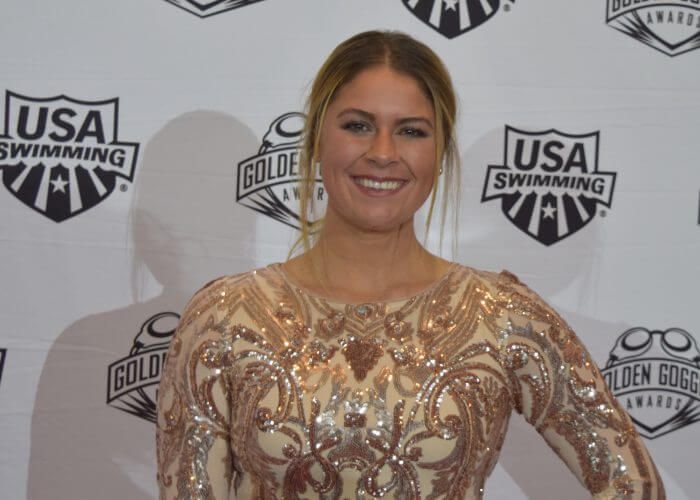
Photo Courtesy: Annie Grevers
Elizabeth Beisel: There was a moment where it really solidified in my mind. I remember I was sitting, eating alone. And so, with Natalie Coughlin, she was on my first ever national team. Pan Pac’s in ‘06. And I’ll never forget I was eating a meal alone. And she sat down with me and she sat with me for forty five minutes and just asked me how I was and made me feel included. And I remember having that moment of, wow, if I’m ever like Natalie, one day I’m going to do that for somebody else. She really left a mark on me in the best way possible.
Champion’s Mojo: That is beautiful. So that was obviously a very young obstacle. What is something a little more recently that that’s been tough that you went through?
Elizabeth Beisel: I think the hardest thing about ending swimming is you lose an identity. And so for me, I was always Elizabeth Beisel, the swimmer. Whether it was in high school and college or even as a professional. And then the minute that you’re done competing as a swimmer, you’re no longer a swimmer. You can like to swim, but that’s not who you are anymore. And so for me, it was navigating those waters into figuring out who I was outside of swimming. And one of those things that was hard for me was when you’re in practice every day, you’re hitting a goal or you’re trying to beat something that you did the day before. And when you’re not swimming and you’re not practicing every day, you lose that. You lose that sort of competition. And I miss that. I miss being challenged. It’s something as basic as just being challenged by the clock. For me it was figuring out what is the next stage of my life going to look like and how am I going to challenge myself? And so that’s sort of where I was like you know what? All these people are suggesting for me to write a book. I don’t know if I can write a book or not, but I’ll try. I’ll do my best or I don’t know if I can commententate on this one meet, but I’m going to at least say yes and try. And so that’s sort of where I got the mentality of saying yes to everything, because then at least you can cross out what you didn’t enjoy. And for as athletes, whether you’re a swimmer or not, you define yourself as your sport. And the minute you’re done, you sort of have to mourn the death of that version of yourself and then reinvent yourself. So that’s been a challenge.
Champion’s Mojo: How did adding new challenges come about?
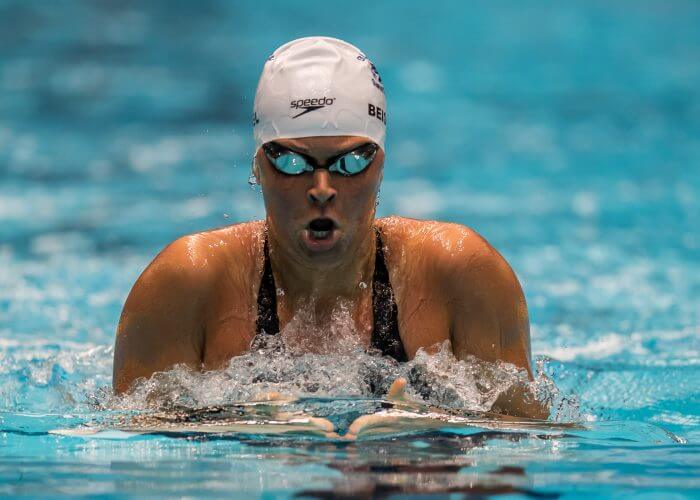
Photo Courtesy: Peter H. Bick
Elizabeth Beisel: It’s not like they just fell on my plate. I was reaching out to whoever it was that I needed to reach out to. And I was like, hey I really want to get into broadcasting. Would you let me do this meet? I’ll do it for free. Whether it was a small dual meet in Rhode Island or asking to come down to Gainesville and work a meet. I was putting myself out there. When you’re a swimmer for your entire life, what’s your resume say? You don’t have any work experience or internship experience. So here I am thinking of walking into an interview as Elizabeth Beisel. You can say you’re a three time Olympian, but nobody cares what my 400 IM time is. That’s not going to get me the job. What’s going to get me the job is experience. So that’s sort of been what the past couple of years has been like for me. Just building my resume and getting my feet on the ground. Making sure that one day, if I did indeed want to go into broadcasting or whatever it is, that I’ll at least have something under my belt to use as like, hey, I’ve done this. Here’s my resume. I’m not just a novice.
Champion’s Mojo: So what techniques do you think you learned from swimming that you’re using now in this life?
Elizabeth Beisel: I think resiliency is a very good one. For a swimmer it’s not all just up, up, up. Our trajectory is up and down. It’s like a roller coaster. There was a point in my career where I didn’t go a best time in the 200 back for five years. So you’re coming in to practice every day thinking about that 200 back. And the next race is the race. I’m going to do it. And nope. And finally, you’re like, do I give up? And then the moment that you don’t, I feel like, is the moment that it happens. And so for me, it’s just getting through those mental roadblocks, because that’s really what separates a good athlete and a good person from a great person. And whatever it is that you do,maybe things aren’t going my way right now, but it’s not a permanent state. I’m going to be able to move past this and move forward and get better. So for me, it’s just being resilient and understanding that not everything happens overnight. I think we live in a day and age with social media and our phones and we want everything instantly. I want to know the Google search results within seconds. But guess what? You know, you don’t become an Olympian in seconds. You don’t become a really good reporter, whatever it is that you do in seconds. It’s a lot of years of hard work. And putting yourself out there and risking and that’s sort of my mentality for the past few years is just being resilient and risking it.
Champion’s Mojo: If someone is out there has lost an identity, what advice would you give to people out there that are going through that?
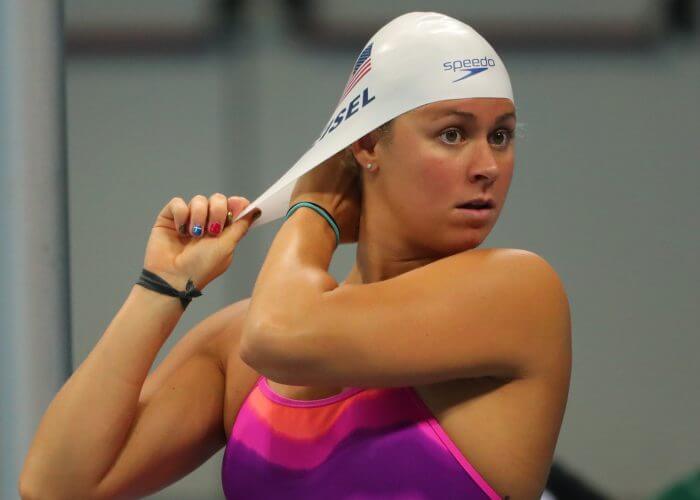
Photo Courtesy: Rob Schumacher-USA TODAY Sports
Elizabeth Beisel: I think balance is key. And sometimes hindsight is always 20/20. And, if you invest too much of yourself in one thing, you’re risking something. Because if you do get injured or if you get divorced, then what? What now? The only constant in life is change. So at least you have that going for you, right? For me, I think one of the things that I can relate back to in my swimming career and why I had such a long career at such a high level was the balance that I had in life. I found that balance in music. I’ve played violin and piano since I was three years old. I had days where I would leave the pool and absolutely hate swimming. I’d be like, Coach, I’m quitting and throw a tantrum on the pool deck. And then I would go to the music center at the University of Florida campus. I’d bring my violin and I would just play for like an hour and a half. And that was where I found solace. It just brought me back down to earth. You’re doing something that you also love. That was sort of my safe haven. That’s where I went when I was really sad about swimming. You can love pottery and you can be the worst pottery maker in the world. But as long as you enjoy it and it brings you something else outside of what is your main event or whatever it is. That’s going to give you that balance that you need in order to maintain that threshold of whatever you’re doing. So I do think balance is important.
Champion’s Mojo: Are you still doing music? Do you still play the violin and the piano?
Elizabeth Beisel: Yeah, I do. That’s one thing that not many people know about me is I’ve actually been playing music more than I’ve been swimming. It did take a backseat during my swimming career for obvious reasons. But now that I’m done swimming that’s one of the things that I’ve sort of opened up again, music and playing violin. I performed with the Pittsburgh Symphony Orchestra about a year ago. All the things you can do when you’re not swimming six hours a day.
Champion’s Mojo: Is this in the book?
Elizabeth Beisel: I open up about music a lot in the book because it was sort of like my closet life. Honestly I was also a little embarrassed of it. Y I felt as though I couldn’t really be good at two things. And swimming was my thing. And I felt like talking about my violin was bragging. It was sort of like my little secret thing that I had to make me happy if something wasn’t going right. I play classical violin, like Vivaldi, Mozart, all those. People are like, oh, cool. You know how it is. But I love it. And it’s a door that I’ve been able to reopen since being done swimming. So I’m really, really excited about that.
Champion’s Mojo: So what qualities do you think you have that have made you successful? And that champions, in general, share?
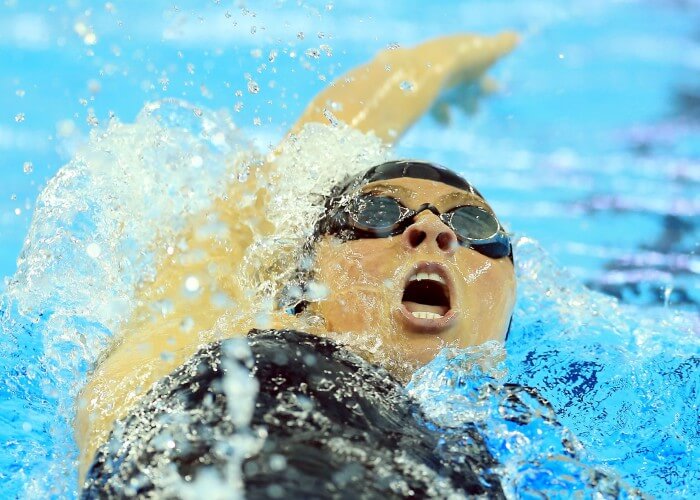
Photo Courtesy: Vaughn Ridley/Swimming Canada
Elizabeth Beisel: I love that you ask that question, because this is my favorite thing to talk about when I do clinics with little kids. Because, for me, looking back to my seven year old self. I had posters of Olympians in my room and they were the superheroes. They were untouchable. They were perfect. They were talented. And I was going to be lucky if I was ever one of them. But here I am. Elizabeth Beisel. I am always the smallest. I come from Rhode Island, the last Olympic swimmer from Rhode Island before me was in 1948. Rhode Island does not produce Olympians. So there were a lot of cards stacked against me. I’m not muscular. I’m sort of just there. I’m a normal girl and I think I have three characteristics that made me the athlete that I was and that was believing in myself, working hard and always racing. And those are three things that anybody listening to this podcast can do. You can transfer the word racing to being competitive.
Champion’s Mojo: I just want to clarify that. So when you say you raced everything, was it competitiveness?
Elizabeth Beisel: I think so. And just not wanting to lose. I think that that is so important. Of course, you always want to win. But I was like, I do not want to lose. And I think there’s a difference.
Champion’s Mojo: So your first trait is believing in yourself. How did you believe in yourself? What tools can you share with our listeners?
Elizabeth Beisel: It’s easier said than done, of course, because we’re human and we always have doubts. But I’ll never forget. I remember the 2008 Olympic trials. I was 15 years old and the 400 IM was the first day. The 200 back was my baby. The 400 IM was just a warm up race. And I remember I broke, out of nowhere, the Olympic trials record in prelims and got seeded first for finals. So I was not even planning on making that final. I was just there to watch and enjoy. And then all of a sudden the pressure hits and it’s all on my shoulders. And when, you know, I’m nervous. I’m like, I’m not ready to make an Olympic team tonight. So I went to the pool that night. I do my first warm up. I throw up all over my best friend while I’m drying off about 30 minutes before my race. I remember I dove back into the pool for my second warm up. Chuck, who is my then coach, pulls me out of the water and he’s like, “What’s up with you? What’s wrong?”, and I just break down into tears. I’m like, I cannot do this tonight. I’m 15. I don’t even have a license. There’s no chance I’ll make the Olympic team tonight. He’s like, I have somebody that’s gonna make you feel better. So he sits me down next to Nelson Diebel. For those listening, Nelson Diebel is the Olympic gold medalist in the 100 breaststroke from ‘92. I have no idea who this man is because I was born in ‘92 and Nelson sits down next to me. He pulls his gold medal out of his pocket and he goes, “If you do not believe in yourself tonight, you will never win one of these.” Then he puts it back in his pocket and walks away. It was like an epiphany moment. When Nelson said those words to me it was the first time I realized that if I didn’t believe in myself, I wouldn’t make an Olympic team. I learned, throughout my swimming career, that the 20 to 30 minutes leading up to a race or a presentation or an interview, those 30 minutes separate a good swimmer or a good person from a great swimmer or a great person. I learned that that night. And ever since that race I always remember to believe in myself. Because if I don’t no one will.
Champion’s Mojo: So did you immediately go from seeing that Olympic medal and having an epiphany that you were going to make the Olympic team?
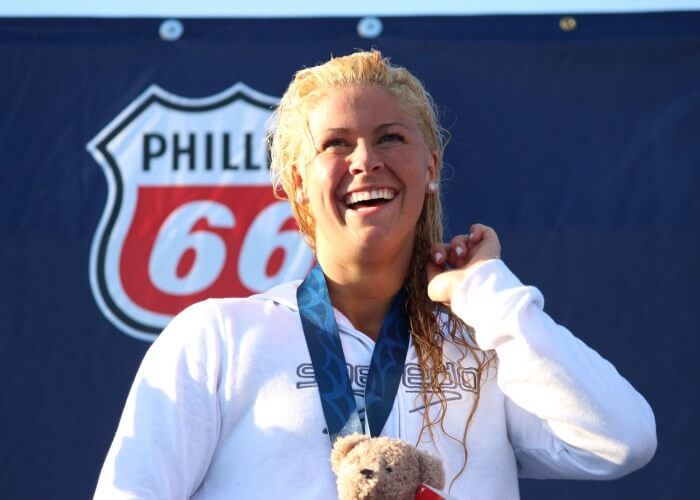
Photo Courtesy: Griffin Scott
Elizabeth Beisel: I jumped back in for warm up and I swam that warm up like I was already an Olympian. It was the most incredible feeling and I haven’t experienced it since. It was the only time where I knew that I was going to do something. I knew I was making that Olympic team. And twenty minutes later, I made my first Olympic team. And so that was just like the most powerful, serendipitous moment that Nelson was there. He gave me that advice. To this day I’m like, Nelson you realize that I’ve gone to the Olympics three times because of you. And so that’s the power. Believing in yourself is just changing your mindset.
Champion’s Mojo: That leads in perfectly to our next question, which is what mindset do you think is critical for success?
Elizabeth Beisel: Positive. Always positive. I think of all the races that I had a negative mindset behind the blocks or races that I was making excuses for myself to not swim fast. Those were my worst races always.
Champion’s Mojo: Even the great Elizabeth Beisel had a negative mindset?
Elizabeth Beisel: I had so many doubts. I think doubts for me primarily came from other people. So I would find myself standing up behind the blocks against Katinka Hosszu or Missy Franklin or Natalie Coughlin. And I would look at them and say their name in my head and I’d be like, I’m not as good as them. There’s no chance I’m going to beat them, you know. The minute that you tell yourself that you believe it. For me it was getting over who I was racing. Getting over comparing myself to them. Anybody can have a good day or a bad day. Even Katinka Hosszue or Elizabeth Beisel. The days that I got beat, it was by somebody who said, I don’t care if you’re Elisabet Beisel, I’m going to beat you. And then it happened. I’m not programmed to win every 400 IM I swim. That was one thing that I had to overcome, people getting in my head without even doing anything.
Champion’s Mojo: What advice do you give to somebody behind the block or somebody is about to do a presentation or somebody who is really nervous about comparing themselves, when they are stuck in the negative?
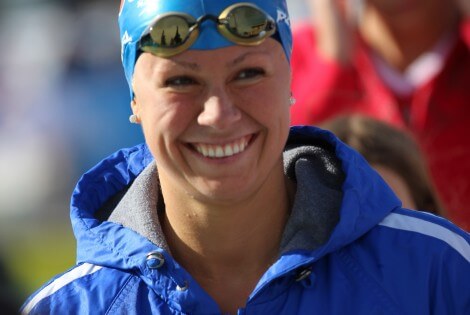
Photo Courtesy: David Farr
Elizabeth Beisel: I always explain it like this. It’s as if you have a flashlight and if you’re flashing that beam on your competitor and that’s all you see, that’s all you’re gonna think about. You have to move that flashlight beam to yourself and be like, OK, forget about Katinka Hosszu. Let’s talk about Elizabeth Beisel. Wow. I have not missed a practice in three months. I’m healthy. I’m ready to go. I’ve eaten the right things. I’ve slept enough. Like these are all the reasons why I I can at least set myself up to win. And so it’s just moving that flashlight of focus onto you. And sometimes that’s hard because it’s a little bit selfish of you. If you’re up against if you’re a guy and you’re up against Michael Phelps, it’s like you just don’t think about Michael Phelps and you’re like, OK, sure. But it really is about just focusing on you and the work that you’ve done and giving yourself reasons why you’re going to do well. And that that always really helped me.
Champion’s Mojo: So I’m going to pull out the IM’er connection between you, Madisyn Cox and Ella Easton because you seem to have a love fest. All three of you talk about the other as just the most amazing friendships. And so this question is, how can women, in all walks of life, be friends with each other, regardless of competition.
Elizabeth Beisel: I think it’s so much easier to be friends and love each other than it is to be enemies and hate each other. At the end of the day you want to be happy for who’s representing the United States of America at the Olympic Games or World Championships or whatever it is. And it’s gonna be so much easier for those girls to compete and go head to head if they’re doing it together. It was always my thing. Swimming’s an individual sport, but the more people you have behind you and the more cohesive the team is as a whole. And I get it. You’re racing against each other. We go through hell to swim that 400 IM together. We connect on a different level than I would connect with a 50 freestyler. And it’s a level of respect that you have for any event. For any competitive person, you have to respect the person that’s competing next to you because they’re going through the same thing.For the 400 IM I want to see Ella and Madison and all of these up and comers thrive in it, because it was my baby for a little bit. And I want to pass that baby over to them. I don’t think we’re a very rivalry heavy sport like we have the Lily King-Yulia Efimova and Mack Horton-Sun Yang rivalries. But that’s a rarity in swimming. The rivalries are always friendly. And I think that’s just because swimmers are the best people. We get each other. We’re staring at a black line for six hours a day and it gets pretty miserable at times. We can’t help but respect each other and connect with each other on a different level. That’s something that I hope to pass on to the Leah Smith.s and the Ella Easton’s and the Madison Cox’s. Everybody, anybody, honestly. But it’s just bringing women together as a whole. And I do think that when women get together and they put themselves towards the thing, they will accomplish it.
Champion’s Mojo: Is there anything that we haven’t talked about that you want our listeners to know?
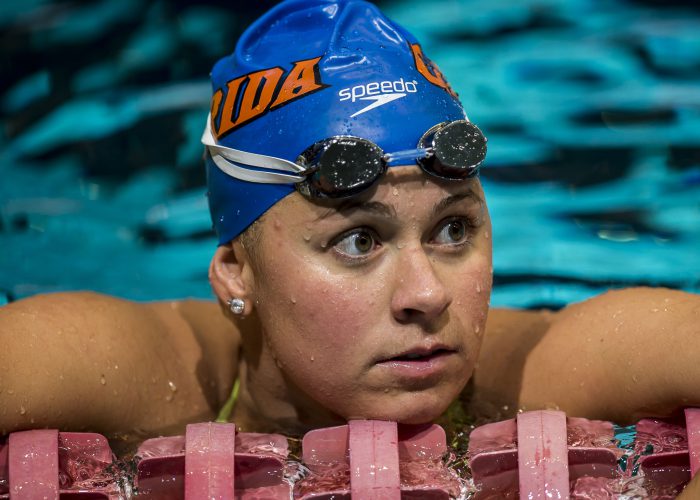
Photo Courtesy: Peter H. Bick
Elizabeth Beisel: It’s an Olympic year. And hopefully if people are listening to this that are still current athletes competing. I know exactly how they feel. The minute the clock turns 2020 it’s almost like a wave of anxiety hits you. And it does not relieve itself until you make that Olympic team. And I hope that the listeners know that I’m here for them. I get where they are. And it’s hard because not many people can really relate to that type of pressure. And it’s one of those things that you can get through. And it’s also only January right now. There’s plenty of time. If you’re injured right now, you’re going to be fine by June and or the Olympics. And if you’re not injured, then just stay healthy. But, at the end of the day, it really is just swimming. And that doesn’t define you. And I think I’m a good example of that. I’m not swimming anymore, but I’m OK. And ,Olympian or not, we’re all going to find our way. And I think as long as you are happy with what you’re doing, no matter what level you’re at, that’s the ultimate goal. And so I hope that everybody listening can sort of take something away that what matters is just to be happy because this life is too short. Don’t get caught up in what other people think of you or say about you or about what you’re doing and just enjoy it and and live in the moment and be happy.
Champion’s Mojo: That is so generous! Tell us a bit more about your book and where can we find it?
Elizabeth Beisel: So Silver Lining is the title and it’s a little bit of a play on words. So Silver is the highest medal that I won at the Olympics. And then silver lining, the phrase, is something I hold dear to my heart because I feel like through the ups and downs, and especially the downs, you have to look at it with the silver lining. You have to see the good side of it. If it’s an injury. I had many injuries during swimming. If it was a leg injury I was like, well, you know what? Silver lining, my arms are gonna get a lot stronger right now. So it’s all about just figuring out how you can trick your mind into being more positive. I don’t think it’s a New York Times bestselling book, but I think a lot of people will be able to relate to that. And that’s the only thing that I want people to get away from this is helping somebody else. And you can find it on Amazon.
Champion’s Mojo: Thank you so much Elizabeth! We wish you the best of luck in everything!
Elizabeth Beisel: My pleasure! Thank you for having me!




She needs her own show